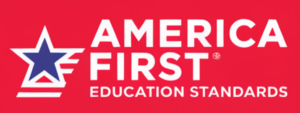Section 1: Purpose & Mission
AFES exists to uphold rigorous academic and institutional standards that align with traditional American values, parental rights in education, and the principles of school choice. Our accreditation ensures that institutions maintain excellence in education while remaining independent from federal overreach.
Section 2: Institutional Eligibility
To qualify for accreditation, an institution must:
- Operate as a private K-12 school, homeschool cooperative, charter school, or hybrid learning institution.
- Demonstrate a commitment to academic excellence and moral education in alignment with classical, patriotic, or faith-based values.
- Provide a structured curriculum that meets or exceeds the highest standards in core subjects (Math, Science, English, History, and Civics).
- Ensure financial stability and operational integrity to maintain long-term student success.
Section 3: Academic Curriculum Standards
- Core Subjects:
- History & Civics: Emphasize the founding principles of the United States, the Constitution, and Western Civilization.
- Mathematics: A structured, sequential approach to problem-solving and logic.
- Science: Evidence-based instruction, including discussions on scientific inquiry and the free exchange of ideas.
- English & Literature: Classical literature, rhetoric, and strong written communication skills.
- Electives & Enrichment: Schools may offer arts, music, technology, vocational training, and entrepreneurship to prepare students for future careers and civic engagement.
- Values-Based Instruction: Schools may integrate faith-based principles or moral education as part of their curriculum, with full parental transparency and choice.
Section 4: Institutional Governance & Parental Rights
- Administrative Oversight: Schools must have a governing body or board that upholds the mission and vision of the institution.
- Parental Rights: Parents must be provided with full transparency regarding curriculum, policies, and any external influences on educational content.
- Teacher Standards: Educators must demonstrate subject-matter competency and alignment with the institution’s educational philosophy.
Section 5: Student Assessment & Performance
- Annual Assessments: Schools must conduct standardized testing or portfolio evaluations to ensure student progress.
- Graduation Standards: Institutions must set minimum graduation requirements that prepare students for higher education, the workforce, or entrepreneurship.
- Post-Graduate Tracking: Schools are encouraged to provide tracking data on college acceptances, vocational placements, or civic engagement outcomes.
Section 6: Accreditation Process & Renewal
- Application: Schools submit an accreditation request with documentation of compliance.
- Review Process: Accreditation teams conduct site visits (physical or virtual) to ensure standards are met.
- Approval & Certification: Upon successful review, schools receive accreditation valid for 5 years.
- Renewal: Schools must undergo a reassessment every 5 years to maintain accredited status.
- Revocation Policy: Accreditation may be revoked for failure to maintain compliance, financial instability, or curriculum deviations that compromise academic rigor.
Section 7: Compliance & Legal Protection
- State Recognition: Accreditation standards align with state education policies where applicable, ensuring access to school choice programs.
- Religious Freedom Protections: Institutions maintaining faith-based instruction are protected under federal and state laws ensuring freedom of religion.
- Nondiscrimination Clause: Accreditation is open to all schools meeting our standards, regardless of religious or ideological affiliation, provided they adhere to the guiding principles of academic excellence and traditional education.
Section 8: Ethics & Accountability
- Transparency: Schools must openly communicate financial, governance, and academic policies.
- Community Standards: Accredited institutions must maintain a culture of respect, discipline, and intellectual integrity.
- Complaint Resolution: A formal review process for disputes between schools and accrediting bodies will be available.
Section 9: Final Provisions These standards are subject to periodic review to ensure ongoing alignment with educational excellence and institutional independence. Schools failing to meet revised standards will be given a probationary period to address deficiencies before accreditation status is reevaluated.
